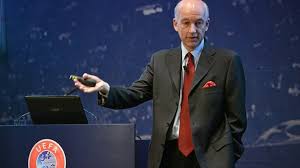By Andrew Warshaw
March 7 – After an 18-month study, football’s lawmakers have released the findings of the most extensive and far-reaching review ever undertaken of the laws of the game in order to inject what former World Cup referee David Elleray (pictured) describes as “more commonsense” into the interpretation of the rules.
While the introduction of video technology dominated last weekend’s International FA Board meeting, separately Elleray presented the results of a detailed analysis carried out by IFAB’s technical group of experts whose task it has been to refine and streamline laws that have stood for over a century but badly need bringing up to date.
First among the changes under a new global gender-neutral lawbook that has clearer vocabulary and 10,000 fewer words is outlawing dummying and hesitating just before taking a penalty, with a booking for the player involved and an indirect freekick awarded to the opponents.
Currently the rules state the kick is retaken if the player scores but in future there will be no second chance. Under the new law, deliberately tricking the goalkeeper into diving one way before striking the kick will be considered cheating. To balance that, goalkeepers will be cautioned for stepping off their line too early. “Goalkeepers are getting away with too much,” Elleray told reporters.
The new rules will apply to every organised match, from a World Cup final to a Sunday park match.
“The game has changed down the years. Some laws have fallen behind modern football and have been updated in a piecemeal fashion,” said Elleray. “One of our concerns was whether the laws as they are protect fair play and whether a team was better off breaking the law.”
From June 1, any players involved in pre-match tunnel bust-ups can be red-carded and substituted before a ball has even been kicked. Referees will now be empowered to send off players before kickoff.
“This is one example of where the laws have not kept up to date, and they need to change so we can protect the image of the game,” said Elleray.
Serious off-the-ball fouls will in future result in a freekick – or in some cases a penalty – rather than a dropball. And no longer will the ball have to go forward at kickoff. The rule is being changed to allow it to go in any direction, just like a freekick.
“What we have tried to do is add some commonsense, write in clearer language, tell referees to be more sensitive to the spirit of the game they are controlling, and bring all the laws up to date,” Elleray said. “We hope this revision will benefit the game. The laws are clearer, more logical, represent what fans would expect to happen and no longer in some cases reward unfair play.”
Contact the writer of this story at moc.l1744324184labto1744324184ofdlr1744324184owedi1744324184sni@w1744324184ahsra1744324184w.wer1744324184dna1744324184

